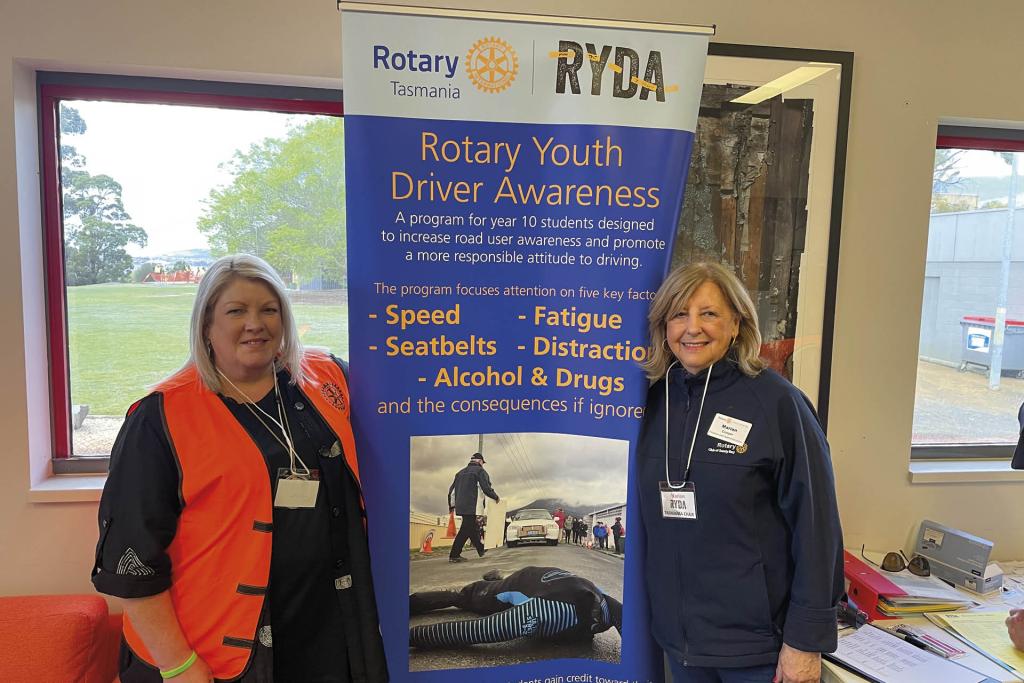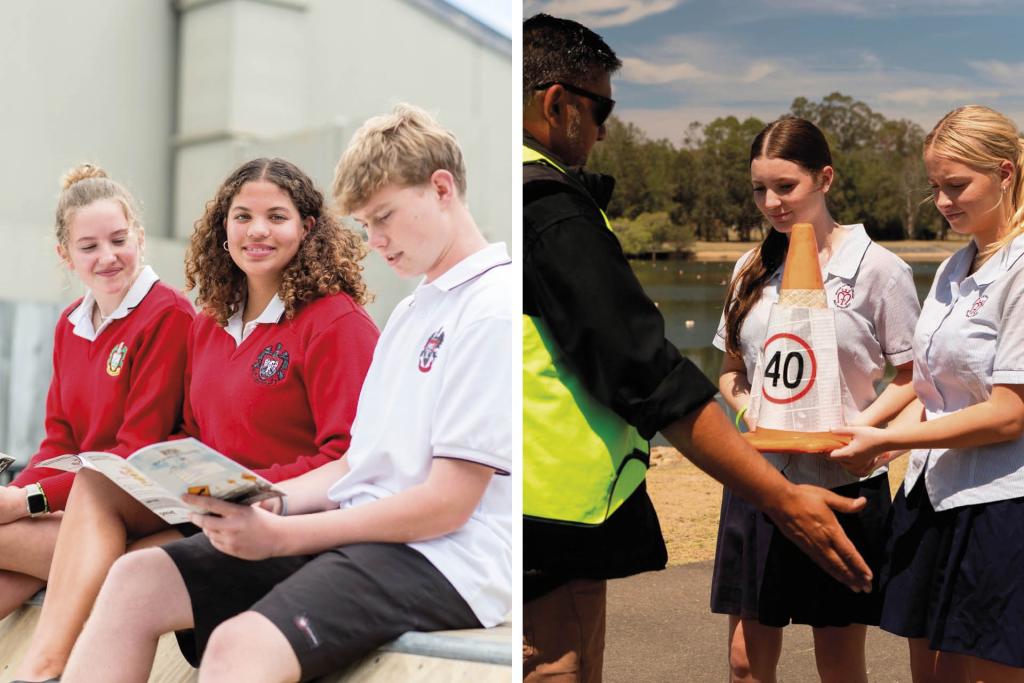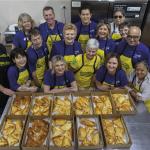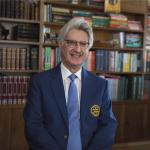Rotary and Road Safety Education: Keeping our young drivers safe behind the wheel
As a community partner of Road Safety Education Ltd (RSE), Rotary clubs and members have been coordinating the Ryda program since 2001. Working side by side with RSE, state police and government departments, Rotary continues to deliver this essential program, keeping our youth safe on the roads and teaching them how to make responsible decisions as both drivers and passengers.
By Sarah Atkins. President, No Borders Rotaract.
In July 2000, four young men lost their lives when their car veered to the wrong side of Old Northern Road, Dural, causing a collision that devastated Sydney’s Hills District community. The driver of the car was 17 and had only held his licence for three weeks.
“The accident occurred at what was considered to be a mild bend in the road,” the district’s coverage reports. “The car was travelling at 110 kilometres per hour in a 60 kilometre per hour zone. [It was] virtually torn in two.”
After a public meeting held by community leaders in response to the tragedy, the Hills Rotary clubs stepped up to establish and finance a program to sponsor youth driver awareness. Right from the beginning, Ryda (which in the beginning was an acronym for Rotary Youth Driver Awareness) attracted strong cooperation across multiple spheres: present at that first meeting were Road Safety Education (RSE) CEO/Managing Director Terry Birss and Directors John Loughlin and Paul Pixton – all Rotarians – along with the Salvation Army, local NSW Police and council members, and the Roads & Traffic Authority.
A committee formed to develop the program, which started as a district project, and to supervise the roll-out. In its inaugural event, held at the Honda Australia Roadcraft Training site in St Ives, NSW, Ryda was offered to 1,200 students from six Sydney schools.
The early success of Ryda was a combination of good funding, good people and good support coming together to address a need,” said RSE Director John Loughlin of the early program, which worked closely with NSW Police, as well as the Departments of Transport, Health and Education.
Twenty-five years on, the now professionally developed, resilience building program is part of a separate non-profit entity (RSE) running in schools from Dunedin, NZ, to Cairns, Qld. More than 850,000 students have been educated by Ryda, with each decade seeing an increase in solidified collaboration between RSE and local governance.
Approximately 15 years ago, Tasmania became the first state to fully fund delivery of the Ryla workshops. The Tasmanian Government allocated $300,000 over four years for Rotary to bring the program to every Year 10 student, supporting the Tasmanian high school curriculum. Since adopting the program in 2006, Tasmania has seen the largest drop in per capita youth driver and passenger fatalities of all the Australian states. John Elliott of RSE attributes this success to Tasmania’s deft handling of Ryda implementation.

“Ryda is an excellent program for kids to learn about the dangers on the road,” John says.
Constable Anthony Bailey, who speaks often at Ryda workshops, agrees. “Learning [responsible] road choices may save their life or someone else’s.”
Marion Cooper, of the Rotary Club of Sandy Bay, has been the chair of Ryda in Tasmania since 2018. In that time, she has helped manage its successful delivery to more than 70,000 Year 10 students statewide, as well as coordinating the program, which runs for seven weeks every year and involves more than 4,000 voluntary hours. Marion has devoted a massive amount of time and energy to Ryda’s continued collaborative success between Rotary and the Tasmanian Government.
Young drivers are the most vulnerable road users, particularly during the first month and during the first 6-12 months of solo driving,” she says. “This is usually because of inexperience, risk-taking and impulsiveness, and increased risk exposure from speeding, night-driving and drink-driving. [The Ryda program] increases knowledge, understanding and motivation to change behaviour.”
In 2023, Ryda won the MAIB Community Road Safety Award at the Tasmanian Community Achievement Awards and in 2015, Marion was presented with the BOC Supporting Excellence in Road Safety – Ryda Champion Award for making our roads a safer place.
The content and delivery of the Ryda program is assessed annually to make sure it continues to be “engaging, interactive and personalised learning for youth”. The workshop, which is supported by a full kit of classroom teaching tools, typically consists of six 30-minute sessions, with students rotating through in groups, guided by Rotary volunteers. The topics covered generally include speed, stopping distances, hazards, distractions, mind state and the consequences of risky driving behaviours. In Tasmania, trained facilitators range from Tasmania Police, road safety and youth education experts and the Brain Injury Association of Australia. The most powerful presentations are given by survivors of road crashes, who lead students in an investigation into their own crash, helping them not only understand the factors that led to it but develop strategies to avoid them.
“There’s no cure for brain injury,” emphasises Doug Cooper, of the Brain Injury Association of Tasmania. “It affects everything… everything we do, everything we feel.”

The students often admit to having learned a lot they’d never thought about before, like the fact cars take far longer to stop when travelling at higher speeds. Launceston student Bonnie said, “It opened my eyes to how I can take a different approach to situations when in the car,” while her classmate Rhianna added, “I learnt a lot out of it and how stopping can be quite difficult depending on the speed you’re going.”
From the bottom of New Zealand to the top of Australia, teamwork continues to be the driving force behind Ryda.
In Leeton, a rural community in NSW, the program runs off a strong collaboration between Leeton Shire Council, Narrandera Shire Council and NSW Police. Road Safety Officer Stephanie Puntoriero says it “really resonates with students” and calls it “a powerful, real-world road safety education [that] blends community insight with law enforcement expertise.”
In Dunedin, NZ, longtime Rotarian Ah-Lek Tay consistently volunteers year after year. He says the Ryda program is an important seed in the community, with impacts that grow far beyond the road. “[Volunteering] is personal satisfaction… a great feeling,” says Terry Birss, one of Ryda’s founding Rotarians and current Group CEO/MD of RSE Australia and New Zealand. Terry retired from the role in July, passing the baton to Maria Lovelock, RSE’s NZ General Manager. Maria has been on the senior leadership team at RSE for nine years and is a current member of the Rotary Club of Papakura. She is honoured to be taking over the role from Terry, and to continue Rotary’s involvement within the organisation. She calls Ryda an “investment to help [young people] make good habits that will stay with them for life.”
Back in Tasmania, Marion Cooper is immensely grateful for the time and energy local Rotarians put in to keep Ryda operating at its best possible capacity.
The program would not be possible without the support of Rotary volunteers… Ryda demonstrates the successful outcome that can be achieved when organisations work together in the interest of the community.”
Join our newsletter for the latest updates
"*" indicates required fields


